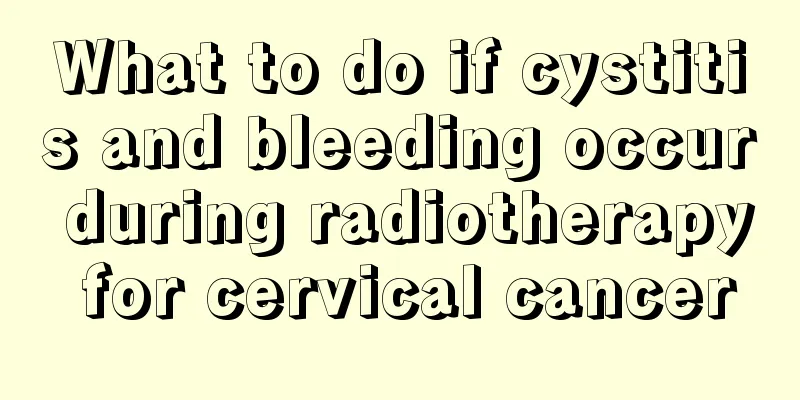What to do if cystitis and bleeding occur during radiotherapy for cervical cancer

|
It is a common clinical phenomenon that cervical cancer patients develop cystitis and hematuria during radiotherapy. If the symptoms are mild, cystitis can be treated by drinking plenty of water and using anti-infective drugs; but if the symptoms are more severe, it is necessary to choose hemostatic drugs, surgery and other methods according to the progression of the disease. 1. Mild symptoms 1. Drink plenty of water: Since radiation may cause certain irritation to the patient's bladder mucosa, leading to bladder congestion and edema and even inflammatory reactions, it is recommended that patients pay attention to maintaining local cleanliness and hygiene in daily life, and increase the amount of water they drink to promote urination, so as to flush out some bacteria and relieve discomfort symptoms. 2. Use anti-infection drugs: For those with relatively mild symptoms, oral antibiotics can be taken as prescribed by the doctor to control infection, such as levofloxacin hydrochloride capsules, cefixime dispersible tablets, etc., to help improve clinical manifestations. 2. Symptoms are more severe 1. Hemostatic drugs: If the above methods are not effective or there is no obvious improvement after treatment, hemostatic drugs can be used for conditioning when necessary. For example, the use of ethylphenolsulfonamide injection, tranexamic acid sodium chloride injection and other drugs as prescribed by the doctor can play a certain role in preventing and treating bleeding. 2. Surgery: If severe bleeding has occurred, you need to go to the hospital in time for treatment and examination. After the specific cause is determined, targeted treatment can be given, such as blood transfusion to replenish blood components in the body to avoid life-threatening bleeding. Electrocoagulation or microwave therapy can also be used to stop bleeding, but scar tissue is likely to form after surgery, affecting normal urination function, so the indications should be strictly controlled. 3. Other methods: In addition to the above treatment methods, cryotherapy, laser therapy and other measures can also be used for treatment, which are all helpful in improving the discomfort symptoms. At the same time, attention should be paid to strengthening nutritional support, eating more foods rich in protein and vitamins, such as eggs, milk, kiwis, etc., which will help the body recover. In addition, cervical cancer patients should pay attention to observe their own changes during radiotherapy. If they find obvious symptoms such as nausea, vomiting, dizziness and headache, they should inform the doctor in time for treatment. |
<<: What are the early symptoms of lung cancer in children
>>: Why do I get cervical cancer and what are the symptoms
Recommend
How to make spicy vinegar sauce
Chili peppers can not only be used as a side dish...
Can you still drink boiled milk?
Milk has a very good health-care effect on the bo...
Psychological nursing goals for breast cancer
Breast cancer makes many women very painful. Nowa...
How to prevent pituitary tumors
Everyone is afraid of getting sick. Once you get ...
Can Sichuan pepper cure onychomycosis?
I have onychomycosis and it can infect two people...
What are the symptoms before death from lung cancer bone metastasis? Three common symptoms before death from lung cancer bone metastasis
Lung cancer is a malignant tumor that occurs in t...
What is respiratory failure?
If respiratory failure is not treated promptly an...
Prevention of gallbladder cancer is very important for the treatment of gallbladder cancer
Prevention of gallbladder cancer is very importan...
What is going on when mucus flows out of the urethra?
Many people find it incredible that there is mucu...
Why are my shoulders getting wider?
Because of different aesthetic viewpoints, people...
What harm does subcutaneous bleeding cause? Why is it so serious?
There are two main causes of subcutaneous bleedin...
What kind of incense can calm the nerves and help you sleep
Nowadays, many women pay great attention to their...
Why does a slow heart rate lead to high blood pressure
If you have a bad heart, you must pay more attent...
What are the symptoms of different types of gliomas
Glioma is a common disease that occurs in the bra...
What is the matter with yellow eyeballs
Yellowing of the eyeballs may be caused by inflam...









